Unit 3 Topic 1知识点汇总
Unit 3 Topic 1 知识清单 仁爱版九年级上册

Unit 3English Around the World Topic 1English is widely spoken throughout the world.Section AⅠ.核心单词1.根据音标写出以下单词及其中文意思。
音标单词中文意思/kɑː(r)ˈtuːn/cartoon 漫画2.根据下列单词写出其中文意思。
character人物;角色;(汉)字;字体;品格widely普通地;广泛地throughout 遍及;贯穿 foreigner 外国人film-maker电影制作人garage 停车房;车库Ⅱ.翻译下列短语1.从今往后;从现在开始from now on2.对……感到高兴;满意于……be pleased with3.坚持做某事stick to doing sth.4.迫不及待做某事can’t wait to do sth.5.有机会做某事have a chance to do sth.6.遍及全世界throughout/ all over/ around the world7.将要能做某事will be able to do sth.8.数以百万的millions ofⅢ.将以下句子翻译为英文,注意括号内要求1.世界上有许多人讲英语。
(使用被动语态)English is spoken by many people in the world.2.他每天坚持在操场上跑步。
He sticks to running on the playground every day. 3.尽你最大的努力,从现在开始更努力地学习。
Try your best and study (much) harder from now on.4.不用担心。
Don’t worry. / Don’t be worried.5.我迫不及待想要去北京。
I can’t wait to go to Beijing.6.你可以把它贴在墙上。
初中英语 仁爱版九年级上册Unit3 Topic1知识点

Unit3 Topic1Section A1.You can stick it on the wall.你可以把它粘在墙上。
(1)stick(动词)粘贴,粘住Eg:Please stick this map of China on the wall.请把这张中国地图粘在墙上。
(2)stick(名词)木棒,木棍,枝条walking stick拐杖(3)stick to sth.坚持,坚守(某种观点、主张、理想、真理、协议)Eg:He always sticks to his own decision.他总是坚持他自己的决定。
(4)stick to doing sth.坚持做某事Eg:He sticks to speaking English every day.他坚持每天说英语。
2.Guess what!猜猜看!3.character人物,字体,性格特征4.Disneyland is enjoyed by millions of people from all over the world.世界上数百万的人都喜欢迪士尼乐园。
(1)is enjoyed被喜欢,是一般现在时的被动语态结构。
(2)by被(由)...,放在句子的后面,特别强调动作或行为的执行者。
5.I hope I can go there one day.我希望有朝一日能去那儿。
one day表示过去或将来的某一天,意为“(过去)有一天,(将来)有朝一日”。
Eg:One day you will understand.总有一天你会明白的。
One day a little monkey was playing by the river.有一天,一只小猴子在河边玩耍。
some day一般只表示将来的某一天,即“有朝一日,总有一天”。
Eg:Some day he will be famous.总有一天他会成名的。
6.Are you ready for your trip?你为旅行准备好了吗?(1)be ready for sth.为某事准备好Eg:The famous singer is ready for the concert.这个著名的歌手已经准备好演唱会。
【知识点】仁爱版英语8年级上册Unit3 Topic1
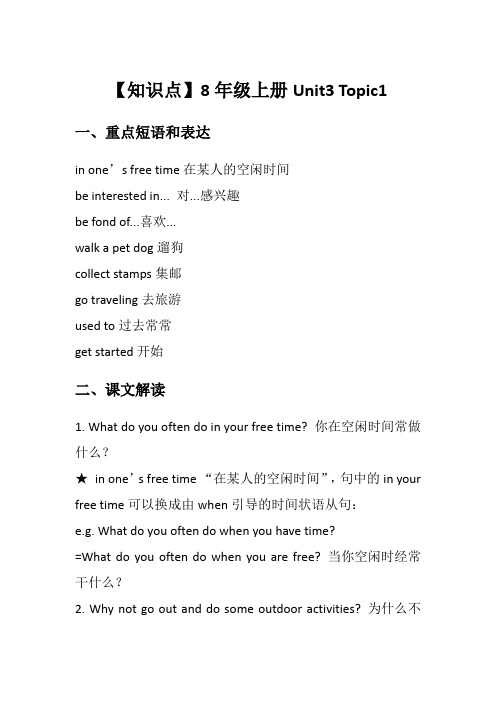
【知识点】8年级上册Unit3 Topic1一、重点短语和表达in one’s free time在某人的空闲时间be interested in... 对...感兴趣be fond of...喜欢...walk a pet dog遛狗collect stamps集邮go traveling去旅游used to过去常常get started开始二、课文解读1. What do you often do in your free time? 你在空闲时间常做什么?★in one’s free time “在某人的空闲时间”,句中的in your free time可以换成由when引导的时间状语从句:e.g. What do you often do when you have time?=What do you often do when you are free? 当你空闲时经常干什么?2. Why not go out and do some outdoor activities? 为什么不做一些户外运动?★why not “为什么不…”,相当于why don’t you,后接动词原形。
★do outdoor activities 做户外运动do indoor activities 做室内运动3. Maybe I need a change. 或许我需要改变一下。
★maybe和may be都表示“也许,或许”的意思,区别如下:①maybe是副词,只能作句子中的状语。
e.g. Maybe he is a student. 或许他是个学生。
e.g. ---Is he 6 years old? 他6岁了吗?---Maybe. 也许吧。
②may be则是两个词,应该分开来看。
may是情态动词,本身不能算作谓语动词,即不能作句子的谓语,使用时必须后接谓语动词;而be则是系动词,可以作谓语。
e.g. He may be a student. 或许他是个学生。
Unit 3 Topic 1知识梳理仁爱版英语八年级上册

Unit 3 Topic 1 知识梳理一.重点单词二.词组Section A1. in one ’s free time=in one ’s spare time在某人的业余时间 2. recite poems朗诵/背诵诗歌 3. love doing sth/ to do sth热爱做某事 4. do some outdoor activities做一些户外活动 5. Sounds good!听起来很好! 6. need a change需要改变一下 7. be interested in sth/doing sth对某事/做某事感兴趣 8. be fond of sth/doing sth.=like/love/enjoy/ prefer+doing sth.喜欢某事、做某事 9. walk a pet dog遛狗 10. go fishing/traveling/swimming去钓鱼/旅行/游泳 11. collect stamps集邮 12. stamps collections邮票收藏品 13. plant flowers种花 14. climb mountains爬高山 Section B1. used to do sth过去常常做某事 2. learn...from...从……学到…… 3. play computer games 玩电脑游戏 hobby (n.)——hobbies (pl.)cut(v.)——cut (过去式)——cutting(现在分词) poem(n.诗) ——poet(n.诗人)stick(v.)——stuck (过去式)——sticking(现在分词) △collect(v.)——collection(n.)△introduction(n.)——introduce(v.) hate(v.) ——like/love/enjoy(反义词)owner(n.)——own (v./adj.) friend(n.)——friendship(n.)——friendly(adj.)——unfriendly(adj.)everyday(adj.)——every day(adv.) funny(adj.滑稽的) ——fun(adj.开心的;令人愉快的)comfort(n./v.)——comfortable(adj.)Section C1.more than=over 超过……以上2.△keep pictures 保存图片3.△other things they want to remember 其他他们想要记住的东西4.△funny collections 好笑的收藏,滑稽的收藏5.the world’s most stupid ideas 世界上最愚蠢的想法6.the world’s most ugly dogs 世界上最丑陋的狗7.△get started 开始8.start with 以……开始9.cut out 剪出10.need sth. to do sth. 需要某物做某事11.stick sth. to... 把某物粘贴在……上12.It’s fun to do sth. 做某事有乐趣13.△make a scrapbook 制作一本剪贴本14.share sth. with sb. 与某人分享某物Section D1.everyday pets 日常宠物2.provide sb. with sth. 提供某人某物3.=provide sth. for sb. 为某人提供某物4.△keep him in the house 把他养在房子里5.keep pets 养宠物6.take a bath=have a bath 洗澡7.in the pond 在池塘中8.whether...or not 是否……9.take sb. out for a walk 带某人出去散步10.be special to sb. 对某人很特别三.重点句子1. And I also enjoy reading stories and listening to music.我也很享受读故事和听音乐2. Why not go out and do some outdoor activities?为什么不出去做一些户外活动呢?3. Maybe I need a change.可能我需要一个改变。
unit 3 Topic 1 Does he speak Chinese知识点归纳
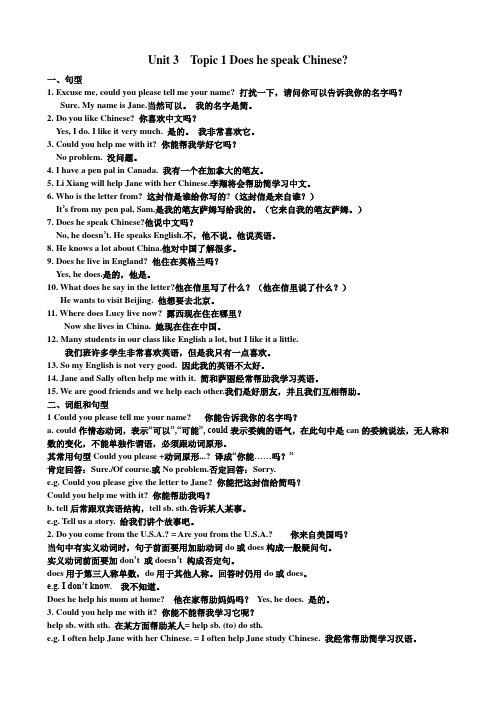
Unit 3 Topic 1 Does he speak Chinese?一、句型1. Excuse me, could you please tell me your name? 打扰一下,请问你可以告诉我你的名字吗?Sure. My name is Jane.当然可以。
我的名字是简。
2. Do you like Chinese? 你喜欢中文吗?Yes, I do. I like it very much. 是的。
我非常喜欢它。
3. Could you help me with it? 你能帮我学好它吗?No problem. 没问题。
4. I have a pen pal in Canada. 我有一个在加拿大的笔友。
5. Li Xiang will help Jane with her Chinese.李翔将会帮助简学习中文。
6. Who is the letter from? 这封信是谁给你写的?(这封信是来自谁?)It’s from my pen pal, Sam.是我的笔友萨姆写给我的。
(它来自我的笔友萨姆。
)7. Does he speak Chinese?他说中文吗?No, he doesn’t. He speaks English.不,他不说。
他说英语。
8. He knows a lot about China.他对中国了解很多。
9. Does he live in England? 他住在英格兰吗?Yes, he does.是的,他是。
10. What does he say in the letter?他在信里写了什么?(他在信里说了什么?)He wants to visit Beijing. 他想要去北京。
11. Where does Lucy live now? 露西现在住在哪里?Now she lives in China. 她现在住在中国。
12.Many students in our class like English a lot, but I like it a little.我们班许多学生非常喜欢英语,但是我只有一点喜欢。
仁爱英语七年级上册Unit3Topic1知识总结
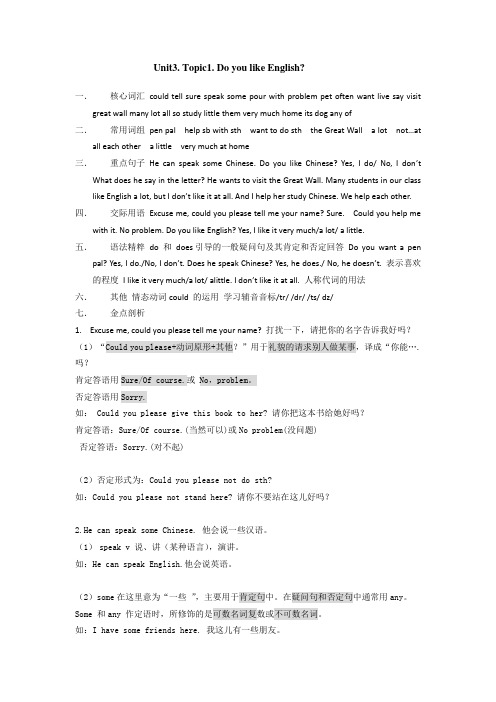
Unit3. Topic1. Do you like English?一.核心词汇could tell sure speak some pour with problem pet often want live say visit great wall many lot all so study little them very much home its dog any of二.常用词组pen pal help sb with sth want to do sth the Great Wall a lot not…at all each other a little very much at home三.重点句子He can speak some Chinese. Do you like Chinese? Yes, I do/ No, I don’t What does he say in the letter? He wants to visit the Great Wall. Many students in our class like English a lot, but I don’t like it at all. And I help her study Chinese. We help each other. 四.交际用语Excuse me, could you please tell me your name? Sure. Could you help me with it. No problem. Do you like English? Yes, I like it very much/a lot/ a little.五.语法精粹do 和does引导的一般疑问句及其肯定和否定回答Do you want a pen pal? Yes, I do./No, I don’t. Does he speak Chinese? Yes, he does./ No, he doesn’t. 表示喜欢的程度I like it very much/a lot/ alittle. I don’t like it at all. 人称代词的用法六.其他情态动词could 的运用学习辅音音标/tr/ /dr/ /ts/ dz/七.金点剖析1.Excuse me, could you please tell me your name? 打扰一下,请把你的名字告诉我好吗?(1)“Could you please+动词原形+其他?”用于礼貌的请求别人做某事,译成“你能….吗?肯定答语用Sure/Of course.或 No,problem。
仁爱英语八年级上册Unit3Topic1重点知识梳理

级上册Unit 3 Topic 1 重点知识Section A2.我最大的爱好my favorite hobby3.背诗歌recite poems4.一个电影迷 a movie fan5.去看电影go to the movie theater6.做一些室内/外活动do some outdoor/indoor activities7.需要一个改变need a change8.遛狗walk a pet dog9.集邮collect stamps10.去旅行go traveling11.种花plant flowers12.喜欢做某事like doing=love doing=enjoy doing13.喜欢做某事be fond of doing14.更喜欢做某事prefer doing15.对…感兴趣be interested in doing16. 对...显示出(浓厚)兴趣show (great) interest in17.这很有趣。
It's great fun.18.听起来不错。
Sounds good.Section B=a collection of stamps2.不完全是not all3.一定是must be4.了解很多learn a lot about…5.过去常常做某事used to do/be6.讨厌做某事hate doing7.流行音乐pop musicSection C1.多于,超过more than=over2.开始get started3.决定做某事decided to do=make a decision to do4.以…开始start with=begin with5.剪下来cut out6.把…粘到…上stick…to…7.与某人分享某物share sth. with sb.8.自我介绍introduce oneself=make an introduction about oneselfSection D1.常见的宠物everyday pet2.日常英语everyday English3.可能may be4.提供某人某物provide sb. with sth.=provide sth. for sb.5.为主人带来爱和安慰provide their owners with love and comfort6.在池塘里洗澡take/have a bath in the pond7.是否、会不会whether…or not8.对某人来说很特别be special to sb.9.把衣服弄脏get the clothes dirty10. 对某人不友好be unfriendly to sb.。
Unit3Topic1知识点英语九年级上册
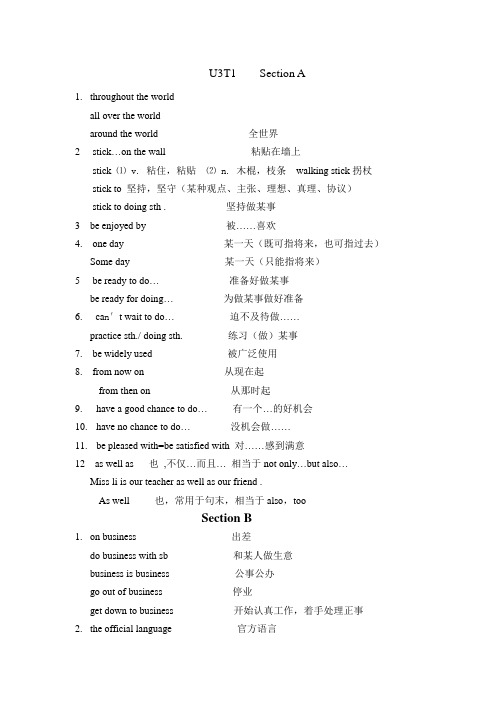
U3T1 Section A1.throughout the worldall over the worldaround the world 全世界2stick…on the wall 粘贴在墙上stick⑴ v. 粘住,粘贴⑵ n. 木棍,枝条walking stick拐杖stick to 坚持,坚守(某种观点、主张、理想、真理、协议)stick to doing sth . 坚持做某事3 be enjoyed by 被……喜欢4. one day 某一天(既可指将来,也可指过去)Some day 某一天(只能指将来)5be ready to do…准备好做某事be ready for doing…为做某事做好准备6.ca n′t wait to do…迫不及待做……practice sth./ doing sth. 练习(做)某事7. be widely used 被广泛使用8. from now on 从现在起from then on 从那时起9.have a good chance to do…有一个…的好机会10.have no chance to do…没机会做……11.be pleased with=be satisfied with 对……感到满意12 as well as 也,不仅…而且…相当于not only…but also…Miss li is our teacher as well as our friend .As well 也,常用于句末,相当于also,tooSection B1.on business 出差do business with sb 和某人做生意business is business 公事公办go out of business 停业get down to business 开始认真工作,着手处理正事2.the official language 官方语言3.be similar to 与……相似4.be the same as 与……一样5.have trouble(in)doing sth 做某事有困难6.have no trouble(in)doing sth 做某事没有困难7.be in trouble 处于不幸、苦恼、困境之中8.look for trouble 自寻烦恼9.get out of trouble 摆脱、走出困境10.if necessary 如果有必要11.Have a good trip 祝你旅途愉快12.I wish you success 祝你成功13.wish you a happy new year 祝你新年愉快14.wish to do sth 希望做某事15.wish sb to do sth 希望某人做某事16.have/hold a conversation 进行交谈,谈话17.get along/on well with 与……相处得好18.divide...into pieces 把……分成块y in bed 躺在床上20.It is possible for sb to do......21.It is possible+ that 从句It is possible for him to finish the work on time。
Unit3Topic1知识点总结仁爱版英语八年级上册

U3Topic1总结单词hobby(hobbies)兴趣爱好recite背诵poem诗歌theater剧院rent租借change改变maybe 也许collect收集stamps邮票plant种植carry携带(carries-carried) coin硬币scrapbook剪贴簿friendship友谊stupid愚蠢的ugly丑陋的decide决定background背景scissors剪刀glue胶水stick粘贴(stuck) lazy懒惰的share分享introduction介绍dangerous危险的snake蛇provide提供owner主人comfort安慰pond池塘special特别pet宠物hate讨厌funny滑稽的dirty肮脏的unfriendly不友好的词性变化own v.拥有-owner n.主人introduce v.介绍-introduc tion n. collect v.收集-collect ion n.收藏品interest n.兴趣-interest ing有趣的(物)-interest ed感兴趣(人)fun n.乐趣-fun ny adj.滑稽的friend n.朋友-friend ly adj.友好的-un friend ly adj.不友好的-friend ship n.友谊短语enjoy/like/love doing 喜欢做某事hate doing讨厌做某事prefer to do/doing 更喜欢做某事have fun doing开心做某事mind doing介意做某事practice doing练习做某事finish doing完成做某事feel like doing 想要做某事be busy doing 忙于做某事read stories读故事recite poems背诵诗歌collect stamps集邮go traveling 去旅游plant flowers种花walk a pet dog遛狗keep pets养宠物listen to pop music听流行音乐collect coins收集硬币photos of famous stars明星照片make a scrapbook做剪贴簿watch DVDs at home在家看碟片go to the movie theater去影剧院stick...to粘贴share sth with sb和某人分享某物cut out pictures剪出图片start with=begin with以…为开始be interested in对……感兴趣be fond of 喜欢provide sb with sth给某人提供某物used to do 过去常常做某事be used to doing习惯做某事do outdoor activities做户外活动take sb out for a walk带某人出去散步be special to sb对某人特别decide to do 决定做某事make a self-introduction做自我介绍句型1.【询问兴趣爱好】What’s your hobby?你的兴趣爱好是什么?2.【询问空闲时间做什么】What do you often do in your free time?你空闲时间经常做什么?3.【used to do 过去常常做某事】I used to enjoy pop music, but now I am fond of playing sports. 我过去喜欢流行乐,但是现在我喜欢做运动。
初中英语 仁爱版九年级上册Unit3 Topic1知识点

Unit3 Topic1Section A1.You can stick it on the wall.你可以把它粘在墙上。
(1)stick(动词)粘贴,粘住Eg:Please stick this map of China on the wall.请把这张中国地图粘在墙上。
(2)stick(名词)木棒,木棍,枝条walking stick拐杖(3)stick to sth.坚持,坚守(某种观点、主张、理想、真理、协议)Eg:He always sticks to his own decision.他总是坚持他自己的决定。
(4)stick to doing sth.坚持做某事Eg:He sticks to speaking English every day.他坚持每天说英语。
2.Guess what!猜猜看!3.character人物,字体,性格特征4.Disneyland is enjoyed by millions of people from all over the world.世界上数百万的人都喜欢迪士尼乐园。
(1)is enjoyed被喜欢,是一般现在时的被动语态结构。
(2)by被(由)...,放在句子的后面,特别强调动作或行为的执行者。
5.I hope I can go there one day.我希望有朝一日能去那儿。
one day表示过去或将来的某一天,意为“(过去)有一天,(将来)有朝一日”。
Eg:One day you will understand.总有一天你会明白的。
One day a little monkey was playing by the river.有一天,一只小猴子在河边玩耍。
some day一般只表示将来的某一天,即“有朝一日,总有一天”。
Eg:Some day he will be famous.总有一天他会成名的。
6.Are you ready for your trip?你为旅行准备好了吗?(1)be ready for sth.为某事准备好Eg:The famous singer is ready for the concert.这个著名的歌手已经准备好演唱会。
仁爱英语八年级Unit3topic1知识点

仁爱英语八年级Unit3topic1知识点一.重点词汇such as 例如used to do sth.过去常常做某事walk a dog = take a dog for a walk 遛狗take/have a bath 洗澡take sb/sth for a walk 带某物/人去散步go hiking 徒步旅行go boating 划船play volleyball 打排球collect stamps/ coins 集邮/收藏硬币plant flowers 种花fly kites放风筝listening to pop/rock/ classical music 听流行/摇滚/古典音乐 climb mountains爬山help sb with sth 在某方面帮助某人help sb (to) do sth 帮助某人做某事二.重点句型:1.What do you often do in your spare time?在你的业余时间里面你都做些什么啊?in one’s spare time “在业余时间”“在闲暇之际”;也可用in one’s free time替换。
如:1)I shall do it in my spare time. 我会在我的业余时间做这件事。
2)In my free time I often go to the movies.在闲暇之际;我常去看电影。
2. I often go fishing.我经常去钓鱼。
go + doing表示“去做某事”go +v-ing结构很常用;多用于体育活动和业余娱乐活动。
如:1)Let’s go fish ing next Sunday.下星期天我们去钓鱼吧。
2)Are you going hiking this weekend?这个周末你打算去远足吗?另外还有: go swimming 去游泳go bathing 去沐浴 go shopping 去购物go climbing 去爬山go skating 去溜冰go skiing 滑雪3. 在英语中有不少由“do + doing”的结构;表示“干某事”。
仁爱英语八年级上册Unit3-topic1知识点总结

Unit3 Our HobbiesTopic1 What is your hobby?一、重点短语such as 例如used to do sth. 过去常常做某事take a bath 洗澡be interested in 对……感兴趣go dancing 去跳舞go boating 去划船play volleyball 打排球collecting stamps 集邮collecting coins 收藏硬listening to pop music 听流行音乐listening to classical music 听古典音乐listening to symphony 听交响乐walking in the countryside 在乡间散步二、重点句型1. Wow! So many stamps! 哇,那么多的邮票!2. We can learn a lot about people, places, history, and special times from stamps. 通过这些邮票我们可以学到许多关于人文、地理、历史和特殊时代的知识。
3. Would you like to collect any of these things? 你想集下面这些东西吗?4. What things do you love collecting? 你喜欢集什么东西?5. I am interested in playing sports. 我对运动感兴趣。
6. What do you often do in your spare time? 在你的业余时间里面你都做些什么啊?7. I often go fishing. 我经常去钓鱼。
8. And I do a lot of reading. 我通常都是阅读一些书籍。
9. I' m a movie fan. 我是一个电影迷。
10.I also rent VCDs and watch them at home. 我也租一些VCD 在家看。
七年级上Unit3topic 1 知识点
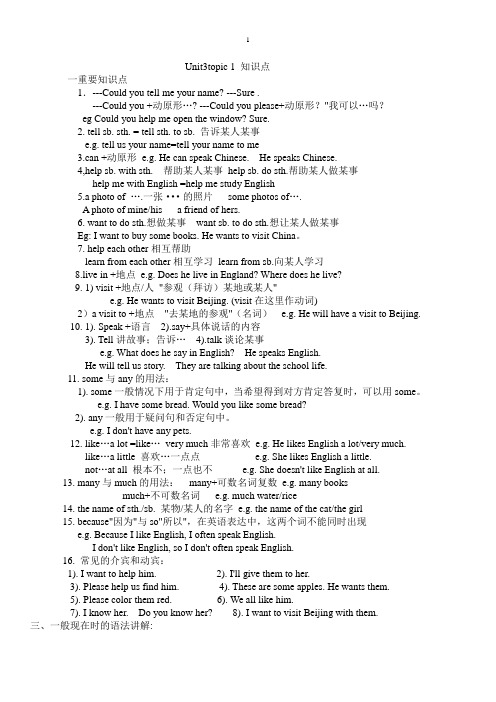
Unit3topic 1 知识点一重要知识点1.---Could you tell me your name? ---Sure .---Could you +动原形…? ---Could you please+动原形?"我可以…吗?eg Could you help me open the window? Sure.2. tell sb. sth. = tell sth. to sb. 告诉某人某事e.g. tell us your name=tell your name to me3.can +动原形e.g. He can speak Chinese. He speaks Chinese.4,help sb. with sth. 帮助某人某事help sb. do sth.帮助某人做某事help me with English =help me study English5.a photo of ….一张···的照片some photos of….A photo of mine/his a friend of hers.6. want to do sth.想做某事want sb. to do sth.想让某人做某事Eg: I want to buy some books. He wants to visit China。
7. help each other相互帮助learn from each other相互学习learn from sb.向某人学习8.live in +地点e.g. Does he live in England? Where does he live?9. 1) visit +地点/人"参观(拜访)某地或某人"e.g. He wants to visit Beijing. (visit在这里作动词)2)a visit to +地点"去某地的参观"(名词) e.g. He will have a visit to Beijing.10. 1). Speak +语言2).say+具体说话的内容3). Tell讲故事;告诉…4).talk谈论某事e.g. What does he say in English? He speaks English.He will tell us story. They are talking about the school life.11. some与any的用法:1). some一般情况下用于肯定句中,当希望得到对方肯定答复时,可以用some。
仁爱版八年级英语上册Unit 3 Topic 1重点知识点总结

仁爱版八年级英语上册Unit 3 Topic 1重点知识点总结一,词组:1, in one’s free time在某人空闲时间2,listen to music听音乐3,do some outdoor activities做户外运动4,sound great听起来很棒5,need a change需要改变6,be fond of喜欢7,be interested in对...感兴趣8,walk a pet dog遛宠物狗9,collect stamps集邮10,plant flowers种花11,go traveling去旅游12,fly kites放风筝13,hate doing讨厌做某事14,cut out剪出15,stick sth to 把某物贴在16,stamp collection邮票集17,learn ...from从哪里学18,used to do sth过去常常做某事19,telephone cards电话卡20,photos of famous stars明星的照片21,get started开始,入手22,decide to do sth决定做某事23,start/begin with以...开始24,share sth with sb与某人分享某物25,in spring在春天26,make a snowman堆雪人27,may be也许是(放句中)28,maybe也许,可能(放句首)29,provide sb with sth=provide sth for sb为某人提供某物30,call sb sth称呼某人某名31,keep a pig养猪32,take/have a bath洗澡33,take sb out for a walk带某人去散步34,be special to sb对某人很特别二,重点句子:1,The meeting last s for an hour.这场会议持续1个小时。
仁爱 八上 Unit 3 Topic 1知识点复习
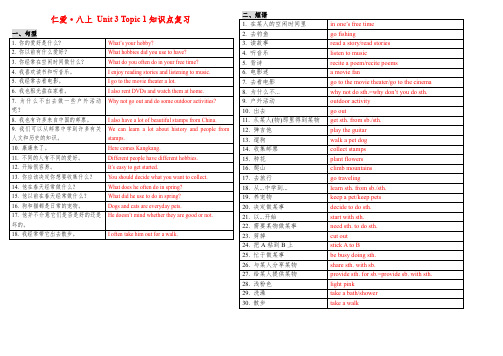
4. remember
remember to do sth.记得要做某事(还没做)。
③prefer doing sth./to do sth.更喜欢做某事。
④enjoy doing sth.享受做某事。
⑤be fond of sth./doing sth.喜欢做某事。
⑥be interested in sth./doing sth.对...感兴趣。
3.倒装句
Here comes Kangkang.
12.弹吉他
play the guitar
13.遛狗
walk a pet dog
14.收集邮票
collect stamps
15.种花
plant flowers
16.爬山
climb mountains
17.去旅行
go traveling
18.从...中学到...
learn sth. from sb./sth.
②be/get used to sth./doing sth.是“习惯(做)某事”。其中to是介词。
③be used to do sth.是“被用来做某事”,是被动语态结构。
2.“喜欢”的多种表达
①like doing/to do sth.喜欢做某事。
②love doing/to do sth.喜爱做某事。
二、短语
1.在某人的空闲时间里
in one’s free time
仁爱版九年级英语上册 Unit 3 Topic 1 重难点知识归纳总结
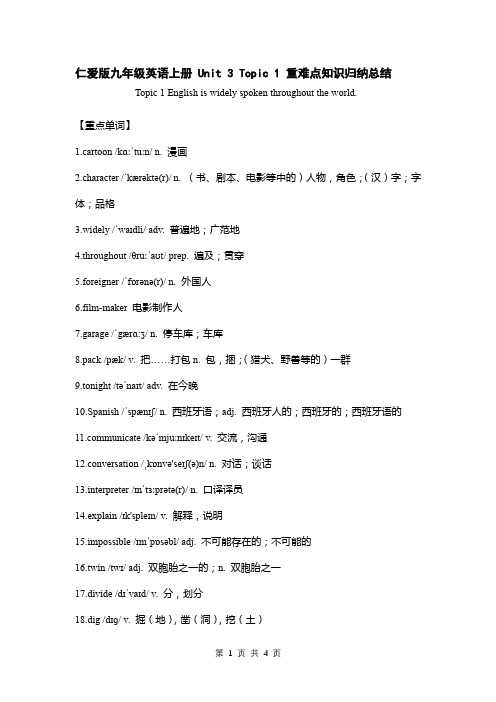
仁爱版九年级英语上册 Unit 3 Topic 1 重难点知识归纳总结Topic 1 English is widely spoken throughout the world.【重点单词】1.cartoon /kɑːˈtuːn/ n. 漫画2.character /ˈkærəktə(r)/ n. (书、剧本、电影等中的)人物,角色;(汉)字;字体;品格3.widely /ˈwaɪdli/ adv. 普遍地;广范地4.throughout /θruːˈaʊt/ prep. 遍及;贯穿5.foreigner /ˈfɒrənə(r)/ n. 外国人6.film-maker 电影制作人7.garage /ˈgærɑ:ʒ/ n. 停车库;车库8.pack /pæk/ v. 把……打包n. 包,捆;(猎犬、野兽等的)一群9.tonight /təˈnaɪt/ adv. 在今晚10.Spanish /ˈspænɪʃ/ n. 西班牙语;adj. 西班牙人的;西班牙的;西班牙语的municate /kəˈmjuːnɪkeɪt/ v. 交流,沟通12.conversation /ˌkɒnvə'seɪʃ(ə)n/ n. 对话;谈话13.interpreter /ɪnˈtɜːprətə(r)/ n. 口译译员14.explain /ɪk'spleɪn/ v. 解释,说明15.impossible /ɪmˈpɒsəbl/ adj. 不可能存在的;不可能的16.twin /twɪ/ adj. 双胞胎之一的;n. 双胞胎之一17.divide /dɪˈvaɪd/ v. 分,划分18.dig /dɪɡ/ v. 掘(地),凿(洞),挖(土)y /leɪ/ v. 放置,安放,搁20.mother tongue 母语21.root /ruːt/ n. 起源,根源;根;词根22.trader /ˈtreɪdə(r)/ n. 商人,买卖人23.native /ˈneɪtɪv/ adj. 出生地的,当地的24.speaker /ˈspiːkə(r)/ n. 讲(某种语言) 的人,发言者25.foreign /ˈfɒrən/ adj. 外国的26.base /beɪs/ n. 根据;根基;总部;v. 以……为基础(或根据)27.European /ˌjʊərəˈpɪə/ adj. 欧洲的28.kingdom /ˈkɪŋdəm/ n. 王国;管辖范围;领域29.tourism /ˈtʊərɪzəm/ n. 旅游业;观光30.conference /ˈkɒnfərəns/ n. (正式的)会议;商谈31.tourist /ˈtʊərɪst/ n. 旅游者;游客32.Britain /ˈbrɪtn/ n. 英国;不列颠33.powerful /ˈpaʊəfl/ adj. 强大的;有权势的;有影响力的34.leading /'liːdɪŋ/ adj. 最重要的,最成功的35.position /pəˈzɪʃən/ n. 位置;方位【重点短语】1.be able to 能够;会2.can’t wait to do sth. 迫不急待地要做某事3.have a (good) chance to do sth. 有(好)机会做某事4.from now on 从今往后,从现在开始5.on business 出差6.be pleased with 对……感到高兴;满意于……7.divide..into.. 把……分成8.be similar to 和……相似9.have no/some trouble (in) doing sth. 做某事没有/有些困难10.ask sb. for help 向某人寻求帮助11.as well as 以及,和12.mother tongue 母语13.take the leading position 处于领先地位14.encourage sb. to do sth. 鼓励某人做某事15.make great progress in doing sth在做某事方面取得很大进展16.be regarded as 被认为是【重点句型】1.Disneyland is enjoyed by millions of people from all over the world.世界上数以百万的人们都喜欢迪斯尼乐园。
Unit 3 Topic 1 知识总结
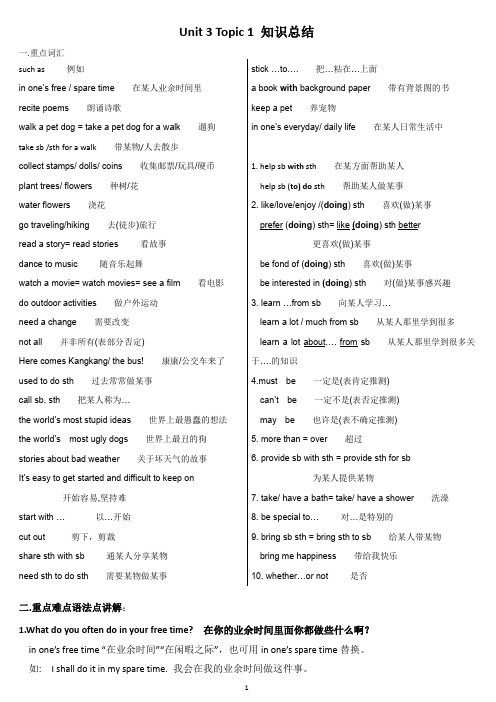
Unit 3 Topic 1 知识总结一.重点词汇such as 例如in one’s free / spare time在某人业余时间里recite poems朗诵诗歌walk a pet dog = take a pet dog for a walk遛狗take sb /sth for a walk 带某物/人去散步collect stamps/ dolls/ coins收集邮票/玩具/硬币plant trees/ flowers种树/花water flowers浇花go traveling/hiking去(徒步)旅行read a story= read stories 看故事dance to music 随音乐起舞watch a movie= watch movies= see a film看电影do outdoor activities做户外运动need a change需要改变not all并非所有(表部分否定)Here comes Kangkang/ the bus!康康/公交车来了used to do sth 过去常常做某事call sb. sth 把某人称为…the world’s most stupid ideas 世界上最愚蠢的想法the world’s most ugly dogs 世界上最丑的狗stories about bad weather 关于坏天气的故事It’s easy to get started and difficult to keep on开始容易,坚持难start with …以…开始cut out 剪下,剪裁share sth with sb 通某人分享某物need sth to do sth 需要某物做某事stick …to…. 把…粘在…上面a book with background paper 带有背景图的书keep a pet 养宠物in one’s everyday/ daily life 在某人日常生活中1. help sb with sth在某方面帮助某人help sb (to) do sth帮助某人做某事2. like/love/enjoy /(doing) sth 喜欢(做)某事prefer (doing) sth= like (doing) sth better更喜欢(做)某事be fond of (doing) sth 喜欢(做)某事be interested in (doing) sth 对(做)某事感兴趣3. learn …from sb 向某人学习…learn a lot / much from sb 从某人那里学到很多learn a lot about…. from sb 从某人那里学到很多关于….的知识4.must be 一定是(表肯定推测)can’t be 一定不是(表否定推测)may be 也许是(表不确定推测)5. more than = over 超过6. provide sb with sth = provide sth for sb为某人提供某物7. take/ have a bath= take/ have a shower 洗澡8. be special to…对…是特别的9. bring sb sth = bring sth to sb 给某人带某物bring me happiness 带给我快乐10. whether…or not 是否二.重点难点语法点讲解:1.What do you often do in your free time? 在你的业余时间里面你都做些什么啊?in one’s free time “在业余时间”“在闲暇之际”,也可用in one’s spare time替换。
八年级上册英语unit3topic1知识点

八年级上册英语unit3topic1知识点在八年级上册英语学习中,Unit 3 Topic 1是一个重要的知识点。
该知识点包括以下内容:一、词汇1.单词:umbrella,drizzle,pour,clap,mist,fan,gloomy,humid,flood,drought,shelter,evaporate等。
2.短语:outdoor activities,weather forecast,rainy day,sunny day,humid day,flood season,drought season等。
二、语法1.一般现在时的用法和句型结构。
2.情态动词can的用法和与现在能力和过去曾经做过某事的区别。
3.行动动词和非行动动词的区别。
三、听力1.听力技巧:重点抓关键词,注意细节,以及练习听不完整的句子。
2.听力练习:听天气预报,听简短对话等。
四、口语1.句型练习:问天气,谈论天气,以及描述不同天气的感受。
2.语音练习:重读和语调的应用。
五、阅读1.阅读技巧:整体理解,寻找主旨,注意细节,以及理解文化差异。
2.阅读练习:读天气短文,读简单对话,以及阅读文化类材料。
六、写作1.写作技巧:列提纲,分类写作,表达观点,注意语法和拼写。
2.写作练习:写天气短文,写介绍某个季节的文章,以及写建议性文章。
以上就是八年级上册英语Unit 3 Topic 1的知识点内容。
同学们学习时,应该注重掌握词汇、语法、听力、口语、阅读和写作等方面,并进行适当的练习和复习,以便更好地理解和应用这些知识点,从而提高自己的英语水平。
- 1、下载文档前请自行甄别文档内容的完整性,平台不提供额外的编辑、内容补充、找答案等附加服务。
- 2、"仅部分预览"的文档,不可在线预览部分如存在完整性等问题,可反馈申请退款(可完整预览的文档不适用该条件!)。
- 3、如文档侵犯您的权益,请联系客服反馈,我们会尽快为您处理(人工客服工作时间:9:00-18:30)。
Unit 3 Topic 1知识点汇总
1.in one’s free time = in one’s spare time在某人的空闲时间
2.go fishing/traveling/swimming/shopping /boating/rowing 去钓鱼/ 旅行/ 游泳/ 购物/划船
3.read stories读故事
4. recite poems 背诗
5.go to the movie theater= go to the movies 去看电影
6. rent DVDs 租DVD
7. do some outdoor activities 做户外运动 8. be interested in (doing) sth. “对……感兴趣”9. be fond of doing sth. = like/love/enjoy/ prefer都+doing sth. 喜欢做某事 10. walk a pet dog = take a dog for a walk 遛狗 11. collect stamps/coins 集邮/收藏硬币 12. plant flowers 种花 13. climb mountains爬山 14. stamp collection邮票集 15. used to do sth.过去常常做某事 16. keep pets喂养宠物 17.call sb. sth.把…称之为… 18.get started 开始 19.start with以…开始
20.need sth to do sth 需要某物做某事 21.cut out剪下
22.stick sth. to sth. 把…粘贴在…上 23. share sth with sb和某人分享某物
24. provide sb with sth = provide sth for sb为某人提供某物 25.take/have a bath 洗澡 26.whether…or not不论是否…… 27.take sb/sth for a walk 带某物/人去散步 28.be special to sb. 对某人来说是特别的 29.hate to do sth. = hate doing sth. 讨厌做某事30. rent sth from sb 从…-租… rent sth to sb 把…租给… 31.Why not/ Why don’t you+动词原形?为什么不…呢?
32. learn a lot from sth. 从…中学到很多…learn sth from sb从某人身上学到…
【重点句型】
1. What do you often do in your free time? 在你的业余时间里面你都做些什么啊?
2. What’s your hobby? I love reciting poems.你的爱好是什么?我喜欢背诗。
3.I also rent DVDs and watch them at home. 我也租一些VCD在家看。
4. I am a movie fan. I go to the movie theater a lot. 我是一个电影迷。
我经常去看电影。
5.. .Why not go out and do some outdoor activities?为什么不走出去做一些户外运动呢?
6.Maybe I need a change. 或许我需要改变。
maybe “也许、可能、大概”副词,通常用于句首 Change n.改变;零钱v.改变 7.I am interested in playing sports.我对运动感兴趣。
8. I am fond of acting.我喜欢表演。
9.I enjoy dancing to music.我喜欢伴着音乐跳舞。
10. What beautiful stamps! 多么漂亮的邮票啊!
11. Are they all from China? Not all.他们都来自中国吗?不全是。
12. It must be great fun. It certainly is.它一定很有趣。
的确如此。
13.We can learn a lot about history and people from stamps. 通过这些邮票我们能够学到很多关于人文、历史的知识。
14. What hobbies did you use to have? 你以前有什么爱好呢? 15.I used to collect baseball cards. But now I’m interested in basketball. 我过去收集棒球卡,但现在对篮球感兴趣。
16. Michael’s favorite hobby is playing baseball.迈克尔最喜欢的爱好是打棒球。
17. I didn’t use to go shopping, but now I like it.我过去不喜欢购物,但是我现在很喜欢。
18. People called it a friendship.人们称之为友谊簿。
19. They kept pictures, letters, poems and other things they wanted to remember. 他们想要保存想要记住的图片、信件、诗和其他东西。
20. It is easy to get started.开始很容易。
21. You need the scissors to cut out the pictures or stories.你需要剪刀来剪掉图片或故事。
22.You need the glue to stick them to the background paper.你需要胶水把他们粘在背景纸上 23. It’ll be lots of fun to make your scrapbook and you can share it with your friends. 制作剪
贴簿会很有趣,你能够和你的朋友们一起分享它。
24. All pets provide their owners with love and comfort in their lives. 所有的宠物都为它们的主人在生活带来舒适和安慰。
25.He doesn’t mind whether they’re good or not.他并不介意它们是否是好的。
【重点语法】used to do sth. 过去常常做某事(现在不做了) used to 的各种句式:肯定句:sb. used to do sth.
否定句: sb. didn’t use to do sth. / sb. usedn’t to do sth. 一般疑问句: Did sb. use to do sth. ? /Used sb. to do sth. ?
答语: Yes, sb. did. No, sb. didn’t. / Yes, sb. used. No, sb. usedn’t…特殊疑问句:特殊疑问词+did sb. use to …. ? /特殊疑问词+used sb. to …. ?。
